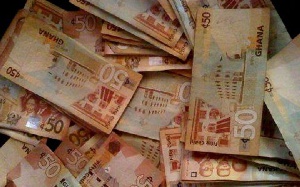The local currency may have relatively held its own against the US dollar for the greater part of this year, but against the Euro and Great Britain’s pound sterling, the cedi’s performance so far has been very woeful – a situation that would bring misery rather than relief to importers.
In the beginning of the year, the Euro was being sold at GH¢4.3755 on the interbank market --where the banks trade among themselves. As at close of trading on Monday, September 18, the Euro’s value was GH¢5.2703, about 90 pesewas extra than it began the year.
The cedi’s struggle against the Euro means that it has so far depreciated about 17 percent against the European Monetary Unit. The worsening performance means that, an importer who exchanged €1,000 for GH¢4, 3755 in the beginning of the year, will now have to part ways with GH¢5, 2703 for the same €1,000.
The local currency’s performance against the Great Britain’s pound sterling is somewhat better compared to the Euro but not any impressive. The cedi’s year-to-date depreciation against the pound on the interbank market is about 14 percent.
The announcement of Brexit and its attendant uncertainties forced the pound to some lows against some major trading currencies across the world. But with the dust surrounding the Brexit beginning to settle, the sterling is regaining its strength and the cedi clearly seems no match despite the cedi’s gains made during the heat of Brexit’s announcement.
On the interbank market as at Monday, September 18, the pound is selling at GH¢5.9749, up from the GH¢5.1591 it was selling at the commencement of the year. The increment represents approximately a 13.7 percent depreciation in the local currency.
For an importer of goods from the UK, the exchange rate for £1,000 at the beginning of the year was GH¢5, 1591. But the same £1,000 pound now will exchange for GH¢5, 9749.
As at September 18, the cedi has depreciated against the dollar by 4.5 percent compared to the 4.1 percent it did same period last year.
Not all gloom
According to the UK-Ghana Chamber of Commerce, trade volumes between Ghana and the UK is a little over a billion bounds leaning towards more imports than exports for the West African country.
Nevertheless, while importers from the UK or the 16-member European Union will be hard-hit by the pound and euro fall, exporters will be looking to cash in on the windfall. The development between the cedi and two major currencies will mean that exporters will now be earning more cedis for the same proceeds.
For instance, an artifact exporter to the UK or the EU earning £1,000 or euro, would be getting more for the same amount of pound or euro than he was getting in the beginning of the year.
Also, for Ghanaians resident in the UK and the EU, the development will mean that their remittances into the country will fetch more local currency than before.
According to DMA Global, a UK-based payments consultancy firm, formal remittances from UK to Ghana is about US$272 million as at 2015.
Business News of Wednesday, 20 September 2017
Source: thebftonline.com













